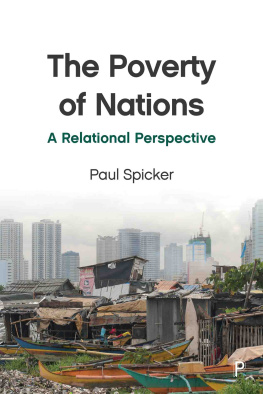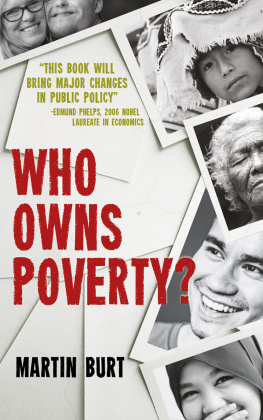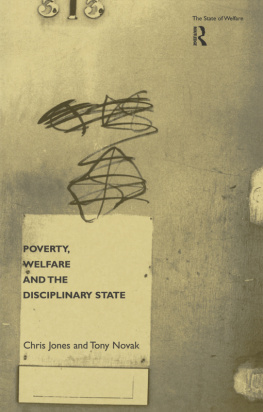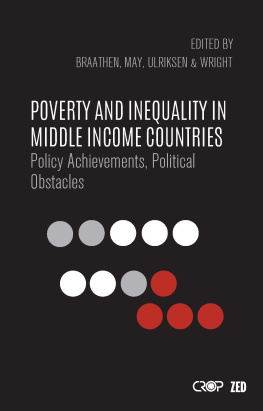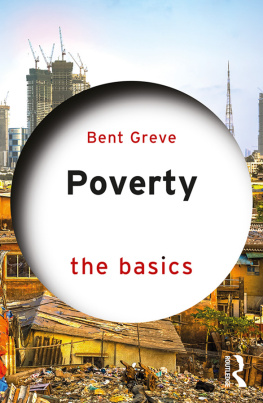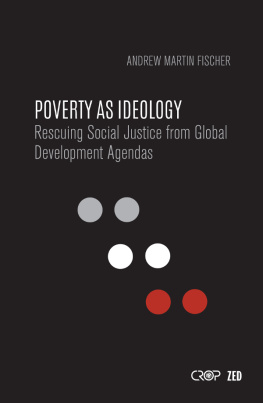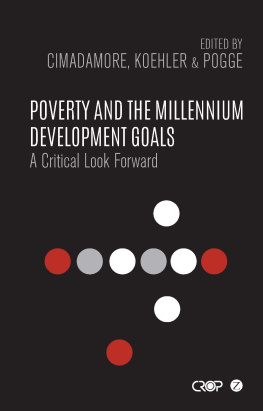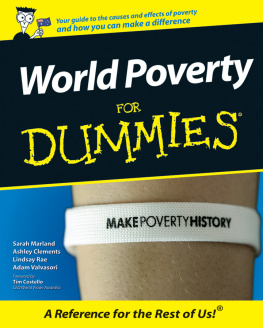Territories of Poverty
GEOGRAPHIES OF JUSTICE AND SOCIAL TRANSFORMATION
SERIES EDITORS
Deborah Cowen, University of Toronto
Nik Heynen, University of Georgia
Melissa W. Wright, Pennsylvania State University
ADVISORY BOARD
Mathew Coleman, Ohio State University
Sapana Doshi, University of Arizona
Zeynep Gambetti, Boazii University
Geoff Mann, Simon Fraser University
James McCarthy, Clark University
Beverly Mullings, Queens University
Harvey Neo, National University of Singapore
Geraldine Pratt, University of British Columbia
Ananya Roy, University of California, Berkeley
Michael Watts, University of California, Berkeley
Ruth Wilson Gilmore, CUNY Graduate Center
Jamie Winders, Syracuse University
Brenda S. A. Yeoh, National University of Singapore
Territories of Poverty
RETHINKING NORTH AND SOUTH
EDITED BY
ANANYA ROY
EMMA SHAW CRANE
2015 by the University of Georgia Press
Athens, Georgia 30602
www.ugapress.org
All rights reserved
Set in 10/13 Minion Pro by Graphic Composition, Inc.
Most University of Georgia Press titles are available from popular e-book vendors.
Printed digitally
Library of Congress Cataloging-in-Publication Data
Territories of poverty : rethinking North and South /
edited by Ananya Roy and Emma Shaw Crane.
pages cm. (Geographies of justice and social transformation ; 24)
Includes bibliographical references and index.
ISBN 978-0-8203-4842-1 (hardcover : alk. paper) ISBN 978-0-8203-4843-8 (pbk. : alk. paper) ISBN 978-0-8203-4844-5 (ebook)
1. Poverty. 2. Equality. 3. PoorPolitical activity. 4. Public welfare. 5. Economic assistance, Domestic. 6. Economic assistance.
I. Roy, Ananya. II. Crane, Emma Shaw.
HC79.P6T46 2015
339.4'6dc23
2015005761
British Library Cataloging-in-Publication Data available
In memory of the life and work of
our beloved colleague
Michael B. Katz.
CONTENTS
ANANYA ROY AND EMMA SHAW CRANE
ANANYA ROY
MICHAEL B. KATZ
LUIS FLORES JR.
AKHIL GUPTA
JAMIE PECK AND NIK THEODORE
BILL MAURER
CHRISTINA GOSSMANN
VINCANNE ADAMS
REBECCA PETERS
JU HUI JUDY HAN
ANH-THI LE
ALYOSHA GOLDSTEIN
ERICA KOHL-ARENAS
LOC WACQUANT
STEPHANIE ULLRICH
HIBA BOU AKAR
ANANYA ROY, STUART SCHRADER, AND EMMA SHAW CRANE
TEDDY CRUZ
SOMAYA ABDELGANY
EMMA SHAW CRANE
PREFACE
Why Territories of Poverty Now?
Our interest in questions of poverty and inequality has been directed by the numerous places and histories that have shaped our lives, from Kolkata, India, to Chiapas, Mexico; from Oakland, California, to Beirut, Lebanon. Convening and curating a joint project of scholarship, we were both inspired by two genres of research, critical ethnographies of development and social histories of welfare and penality, which have allowed us to make sense of these places and histories. We were also keenly aware that these genres remained divided and separated, rarely in conversation across academic borders. Yet in our academic and political lives, we each drew extensively on both, crossing these forbidden borders out of necessity. From the very start, Territories of Poverty was meant to occupy this transgressive space.
But there was something else that mattered to us: the work of theory. This project is unapologetically concerned with theorytheory as an argument about the world, theory as a concern with the epistemology of power, and theory as a collective imagination. Bound together by the classroom of the public university where we first metEmma as student and Ananya as teacherwe have participated in the scarcely voiced and yet ever-present task of rethinking our inheritances of authoritative knowledge. Theory for usas those initial roles of student and teacher have been dramatically revised and reversedremains a crucial site of politics. And theories of poverty have been especially important. Following Alice OConnors work, we are interested in the encounter between the social sciences and the problematic of poverty. As Emma notes in the conclusion of this book, how we think and act on poverty informs how we imagine what is possible, and what is just. To remake theories of poverty is thus an effort to consider what this book series foregrounds as key themes: geographies of justice and social transformation.
But to remake theory is also an effort to remake the institutional context within which we undertake the work of representation. Theory, as Emma notes, must ride the bus! To do so we engage not only in interdisciplinary collaborations but also in intergenerational ones. It is in the interstices of disciplines and generations that new possibilities of representation and transformation can be forged. With this in mind, Territories of Poverty gathers not only the scholarship of multiple disciplines but also that of multiple generations. Thus, in conversation with the full-length chapters are short essays by undergraduate and graduate students at the University of California, Berkeley, who participated in organizing and documenting the conference that resulted in this book. We wanted themAnh-Thi Le, Christina Gossmann, Luis Flores Jr., Rebecca Peters, Somaya Abdelgany, and Stephanie Ullrichto not only organize but also curate, to not only document but also theorize. Their reflections provide an important glimpse of the intergenerational task of remaking theory, and indicate how young scholars inhabit their disciplines and professions.
Finally, for this project, we have sought to enact an analytical shift from thinking about places of poverty to territories of poverty. This is why the cover of the book is the provocative artwork of Chris Johanson. Eschewing the usual images of places of poverty, whether apocalyptic or humanized, we were drawn to an image that, for us, suggests subjectivity, relationality, and multiplicity. Johansons art is part of the Mission School Arts Movement, which emerged in San Francisco in the 1990s. We find the repertoire of this movement to be an important prompt for us to think about the politics of difference and representation across NorthSouth divides.
We agreed easily and immediately upon the term territory, for all of the reasons outlined in Ananyas introduction and throughout the book. As we considered more fully the mandate of collaboration, we made territory the organizing concept of our joint research. Using the occasion of this project, we immersed ourselves in an investigation of two fields of power that we each continue to inhabit and hope to transform: the city of Oakland and the discipline of urban planning. Seeking to understand how community development emerged as a dominant paradigm of progressive urban planning, and how Oakland was the laboratory for such an emergence, we tried to make sense of the territories of our own existence: city and discipline.
As we complete this book, the full meaning of territory is very much on our minds. During the preparation of our first draft of the manuscript, Janet Napolitano, then Secretary of the Department of Homeland Security, was appointed the first woman president of the University of California, what we believe to be the worlds premier public university, and of which we are both alumna and now at which we are each educator and researcher. If


